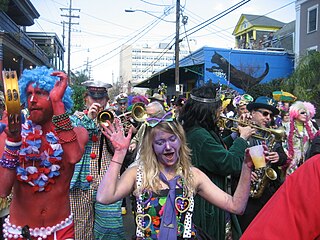
Mardi Gras refers to events of the Carnival celebration, beginning on or after the Christian feasts of the Epiphany and culminating on the day before Ash Wednesday, which is known as Shrove Tuesday. Mardi Gras is French for "Fat Tuesday", reflecting the practice of the last night of eating rich, fatty foods before the ritual Lenten sacrifices and fasting of the Lenten season.

Carnival is a Catholic festive season that occurs before the liturgical season of Lent. The main events typically occur during February or early March, during the period historically known as Shrovetide. Carnival typically involves public celebrations, including events such as parades, public street parties and other entertainments, combining some elements of a circus. Elaborate costumes and masks allow people to set aside their everyday individuality and experience a heightened sense of social unity. Participants often indulge in excessive consumption of alcohol, meat, and other foods that will be forgone during upcoming Lent. Traditionally, butter, milk, and other animal products were not consumed "excessively", rather, their stock was fully consumed as to reduce waste. This festival is known for being a time of great indulgence before Lent, with drinking, overeating, and various other activities of indulgence being performed. For example, Pancakes, donuts, and other desserts are prepared and eaten for a final time. During Lent, animal products are eaten less, and individuals have the ability to make a Lenten sacrifice, thus giving up a certain object or activity of desire.
The Mistick Krewe of Comus, founded in 1856, is a New Orleans, Louisiana, Carnival krewe. It is the oldest continuous organization of New Orleans Mardi Gras festivities.

The holiday of Mardi Gras is celebrated in all of Louisiana, including the city of New Orleans. Celebrations are concentrated for about two weeks before and through Shrove Tuesday, the day before Ash Wednesday. Usually there is one major parade each day ; many days have several large parades. The largest and most elaborate parades take place the last five days of the Mardi Gras season. In the final week, many events occur throughout New Orleans and surrounding communities, including parades and balls.
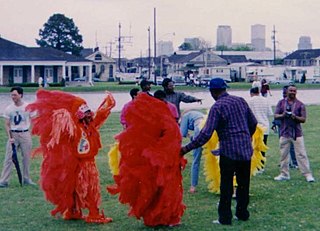
Mardi Gras Indians are black carnival revelers in New Orleans, Louisiana, who dress up for Mardi Gras in suits influenced by Native American ceremonial apparel.

The Toronto Caribbean Carnival, formerly known as Caribana, is a festival of Caribbean culture and traditions held each summer in the city of Toronto, Ontario, Canada.It is a pan-Caribbean Carnival event and has been billed as North America's largest street festival, frequented by over 1.3 million visitors each year for the festival's final parade and an overall attendance of 2 million.

The Second Line is a tradition in parades organized by Social Aid and Pleasure Clubs (SAPCs) with brass band parades in New Orleans, Louisiana, United States. The "main line" or "first line" is the main section of the parade, or the members of the SAPC with the parading permit as well as the brass band. The Second Line consists of people who follow the band to enjoy the music, dance, and engage in "community." The Second Line's style of traditional dance, in which participants dance and walk along with the SAPCs in a free-form style with parasols and handkerchiefs, is called "second-lining". It is one of the most foundationally Black American-retentive cultures in the United States. It has been called "the quintessential New Orleans art form – a jazz funeral without a body". Another significant difference from jazz funerals is that Second Line parades lack the slow hymns and dirges played at funerals.
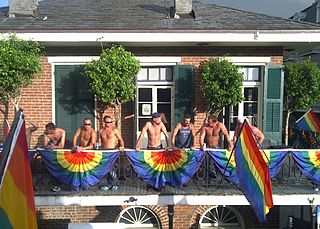
Southern Decadence is an annual six-day event held in New Orleans, Louisiana, by the gay and lesbian community during Labor Day Weekend, culminating in a parade through the French Quarter on the Sunday before Labor Day.
The Westheimer Street Festival was a community street fair held bi-annually in Houston, Texas, United States from approximately 1971 to 2004. The festival underwent name and management changes afterwards. By 2009 the street festival was absorbed into what is currently now known as the Free Press Summer Fest.

Louisiana Creoles are people descended from the inhabitants of colonial Louisiana before it became a part of the U.S. during the period of both French and Spanish rule. As an ethnic group, their ancestry is mainly of African, French, Spanish and Native American origin. German, Irish, and Italian immigrants also married into these groups. Louisiana Creoles share cultural ties such as the traditional use of the French, Spanish, and Louisiana Creole languages and predominant practice of Catholicism.
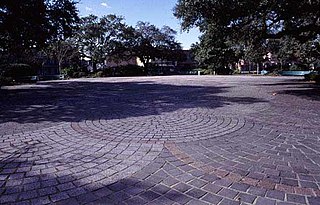
Congo Square is an open space, now within Louis Armstrong Park, which is located in the Tremé neighborhood of New Orleans, Louisiana, just across Rampart Street north of the French Quarter. The square is famous for its influence on the history of African American music, especially jazz.

The Antiguan Carnival is a celebration of the emancipation of slavery in the country held annually from the end of July to the first Tuesday in August. The most important day is that of the j'ouvert, in which brass and steel bands perform for much of the island's population. Barbuda's Carnival, held in June, is known as Caribana. The Antiguan and Barbudan Carnivals replaced the Old Time Christmas Festival in 1957, with hopes of inspiring tourism in Antigua and Barbuda. Some elements of the Christmas Festival remain in the modern Carnival celebrations.
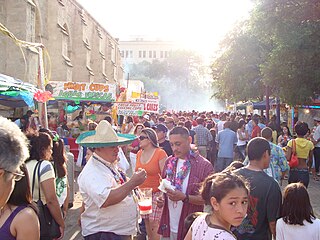
Fiesta San Antonio is an annual festival held in April in San Antonio, Texas, and is the city's signature event since 1891. The festival, also known as the Battle of Flowers, commemorates of the Battle of the Alamo, which took place in San Antonio, and the Battle of San Jacinto, which liberated Texas from Mexico in April 1836.

The first unofficial American Mardi Gras took place on March 3, 1699, when French explorers Pierre Le Moyne D'Iberville and Sieur de Bienville landed near present-day New Orleans, Louisiana. They held a small celebration and dubbed their landing spot Point du Mardi Gras. There were many other unofficial French celebrations on the Gulf and Atlantic coasts during the 17th century.
Music tourism is the act of visiting a city or town, to see a music festival or other music performances. This sort of tourism is particularly important to small villages such as Glastonbury, as well as large cities like Glasgow.

Mardi Gras in the United States is not observed nationally across the country, largely due to the country's Protestant and Anglo roots. Mardi Gras and Carnival are mostly Catholic holidays, while the United States has a Protestant majority population. However, a number of cities and regions in the U.S. have notable Mardi Gras or Carnival celebrations. Most of these places trace their Mardi Gras celebrations to French, Spanish, and other Catholic colonial influences on the settlements over their history. The earliest Carnival celebration in North America occurred at a place on the west bank of the Mississippi river about 60 miles downriver from where New Orleans is today; this Mardi Gras on the 3 March 1699 and in honor of this holiday, Pierre Le Moyne, Sieur d'Iberville, a 38-year-old French Canadian, named the spot Point du Mardi Gras near Fort Jackson. The earliest organized Carnival celebrations occurred in Mobile, Biloxi, New Orleans, and Pensacola, which have each developed separate traditions. In addition, modern activities generally vary from city to city across the U.S.
The culture of Louisiana involves its music, food, religion, clothing, language, architecture, art, literature, games, and sports. Often, these elements are the basis for one of the many festivals in the state. Louisiana, while sharing many similarities to its neighbors along the Gulf Coast, is unique in the influence of Cajun culture, due to the historical waves of immigration of French-speaking settlers to Louisiana. Likewise, African-American culture plays a prominent role. While New Orleans, as the largest city, has had an outsize influence on Louisiana throughout its history, other regions both rural and urban have contributed their shared histories and identities to the culture of the state.
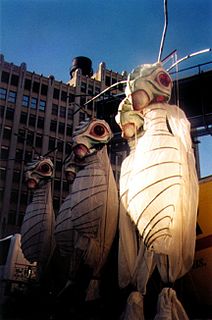
Processional Arts Workshop (PAW) is an ensemble of performing artists and theatrical technicians founded in 1998, devoted to pageant puppetry and processional art. They are also known by the name Superior Concept Monsters (SCM). They are best known for creating the large-scale puppet performances that lead New York's Village Halloween Parade.
Cariwest is an annual non-profit three-day Caribbean Arts Festival that takes place annually in the second weekend of August in the heart of downtown Edmonton, Alberta. Cariwest and its surrounding events attract more than 60,000 people each year. The festival gives the attendees a chance to enjoy Caribbean culture.